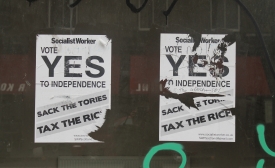iran
Iran’s President, Hassan Rouhani, did not shake hands with Barack Obama at the United Nations this week, a year after their celebrated cell-phone chat. The two men didn’t even pass each other in the hallway. But Rouhani did give a quiet dinner at his hotel on Tuesday for twenty former American officials—including a secretary of state, three national-security advisers, and a chairman of the Joint Chiefs of Staff—from all six Administrations since the 1979 revolution.
Iran's Ambassador to Lebanon Mohammad Ali Fathali and Lebanese Culture Minister Raymond Ariji voiced enthusiasm for utilizing the two sides' entire capacities to bolster Tehran-Beirut cooperation, particularly in cultural spheres.
The Chicago-based Manual Cinema puppet troupe recently returned from a week in Iran at the Tehran Mobarak Puppet Festival, where their performances were welcomed with multiple standing ovations. Drew Dir, one of the US troupe's artistic directors, says the experience was a bit of shadow-puppet diplomacy. “Right before our first show, we were handed a note that told us this was the first time since 1979 that an American flag had been flown in the central city of Tehran - in our honor for participating in the festival," he says.
Iranian Foreign Minister Mohammad Javad Zarif held several diplomatic meetings with his foreign counterparts and UN officials in New York, where world leaders are gathering in to attend the 69th annual session of the United Nations General Assembly.
Over the years, the United States has shown considerable ingenuity in its effort to slow Iran’s production of nuclear fuel: It has used sabotage, cyberattacks and creative economic sanctions. Now, mixing face-saving diplomacy and innovative technology, negotiators are attempting a new approach, suggesting that the Iranians call in a plumber.
Israelis see advancing the peace process with the Palestinians as more important than confronting the Iranian nuclear threat, according to a poll published this week. Indeed, the survey shows, the public is more interested in the Israeli government promoting better ties with moderate Arab states and the European Union than in dealing with Tehran’s nuclear program.

CPD Advisory Board Member Kounalakis on what gets lost when independence is gained.
During the meeting in Dushanbe on Wednesday, Rasulzoda expressed certainty that all the reached agreements between the two countries will be properly implemented. Rasulzoda said that construction of major infrastructural projects in Tajikistan by Iran is the result of signing more than 100 documents and Memoranda of Understanding (MoUs).







